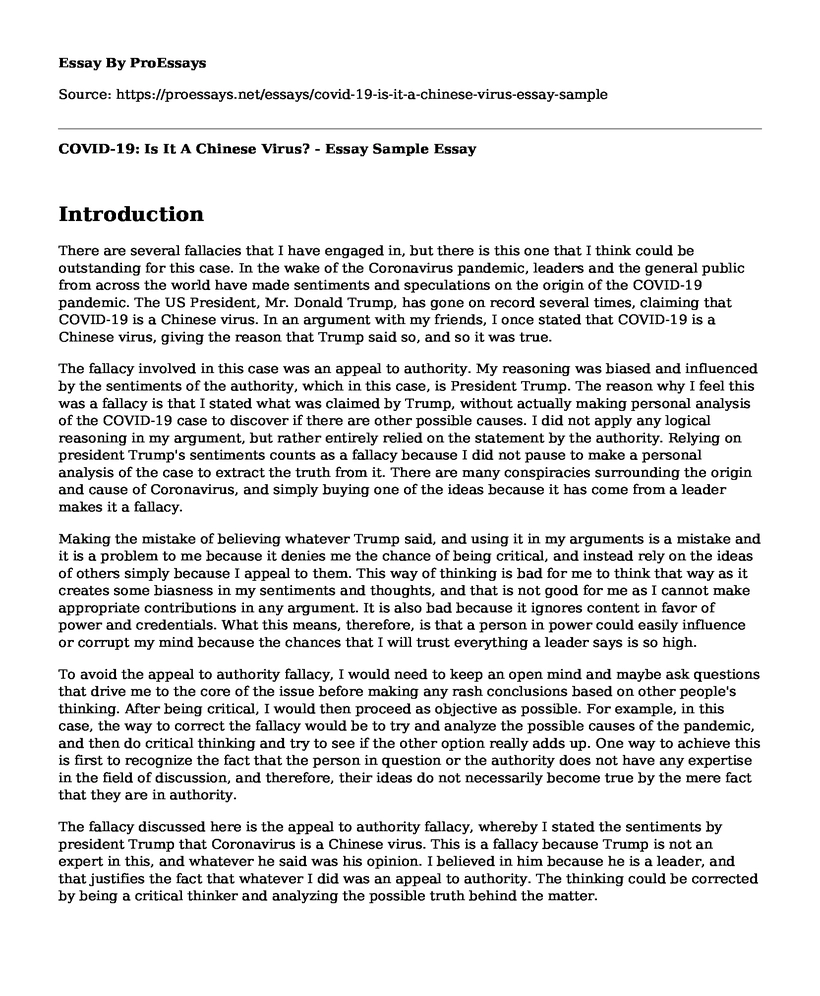Introduction
There are several fallacies that I have engaged in, but there is this one that I think could be outstanding for this case. In the wake of the Coronavirus pandemic, leaders and the general public from across the world have made sentiments and speculations on the origin of the COVID-19 pandemic. The US President, Mr. Donald Trump, has gone on record several times, claiming that COVID-19 is a Chinese virus. In an argument with my friends, I once stated that COVID-19 is a Chinese virus, giving the reason that Trump said so, and so it was true.
The fallacy involved in this case was an appeal to authority. My reasoning was biased and influenced by the sentiments of the authority, which in this case, is President Trump. The reason why I feel this was a fallacy is that I stated what was claimed by Trump, without actually making personal analysis of the COVID-19 case to discover if there are other possible causes. I did not apply any logical reasoning in my argument, but rather entirely relied on the statement by the authority. Relying on president Trump's sentiments counts as a fallacy because I did not pause to make a personal analysis of the case to extract the truth from it. There are many conspiracies surrounding the origin and cause of Coronavirus, and simply buying one of the ideas because it has come from a leader makes it a fallacy.
Making the mistake of believing whatever Trump said, and using it in my arguments is a mistake and it is a problem to me because it denies me the chance of being critical, and instead rely on the ideas of others simply because I appeal to them. This way of thinking is bad for me to think that way as it creates some biasness in my sentiments and thoughts, and that is not good for me as I cannot make appropriate contributions in any argument. It is also bad because it ignores content in favor of power and credentials. What this means, therefore, is that a person in power could easily influence or corrupt my mind because the chances that I will trust everything a leader says is so high.
To avoid the appeal to authority fallacy, I would need to keep an open mind and maybe ask questions that drive me to the core of the issue before making any rash conclusions based on other people's thinking. After being critical, I would then proceed as objective as possible. For example, in this case, the way to correct the fallacy would be to try and analyze the possible causes of the pandemic, and then do critical thinking and try to see if the other option really adds up. One way to achieve this is first to recognize the fact that the person in question or the authority does not have any expertise in the field of discussion, and therefore, their ideas do not necessarily become true by the mere fact that they are in authority.
The fallacy discussed here is the appeal to authority fallacy, whereby I stated the sentiments by president Trump that Coronavirus is a Chinese virus. This is a fallacy because Trump is not an expert in this, and whatever he said was his opinion. I believed in him because he is a leader, and that justifies the fact that whatever I did was an appeal to authority. The thinking could be corrected by being a critical thinker and analyzing the possible truth behind the matter.
Cite this page
COVID-19: Is It A Chinese Virus? - Essay Sample. (2023, May 22). Retrieved from https://proessays.net/essays/covid-19-is-it-a-chinese-virus-essay-sample
If you are the original author of this essay and no longer wish to have it published on the ProEssays website, please click below to request its removal:
- The Effect of Patient Education and Home Monitoring on Medication Compliance
- Research Paper on Issues Facing National and Global Food Systems
- Paper Example on Form of Allergies
- Role of Terrorism in Homeland Security Paper Example
- Essay Example on Single Injury Leads to Decades of Tau Pathology, Dementia
- Essay Example on Cardiovascular Diseases: The Leading Cause of Death Globally
- Paper Sample on Iraq War Syndrome: A Scientific Review of Post-War Effects







